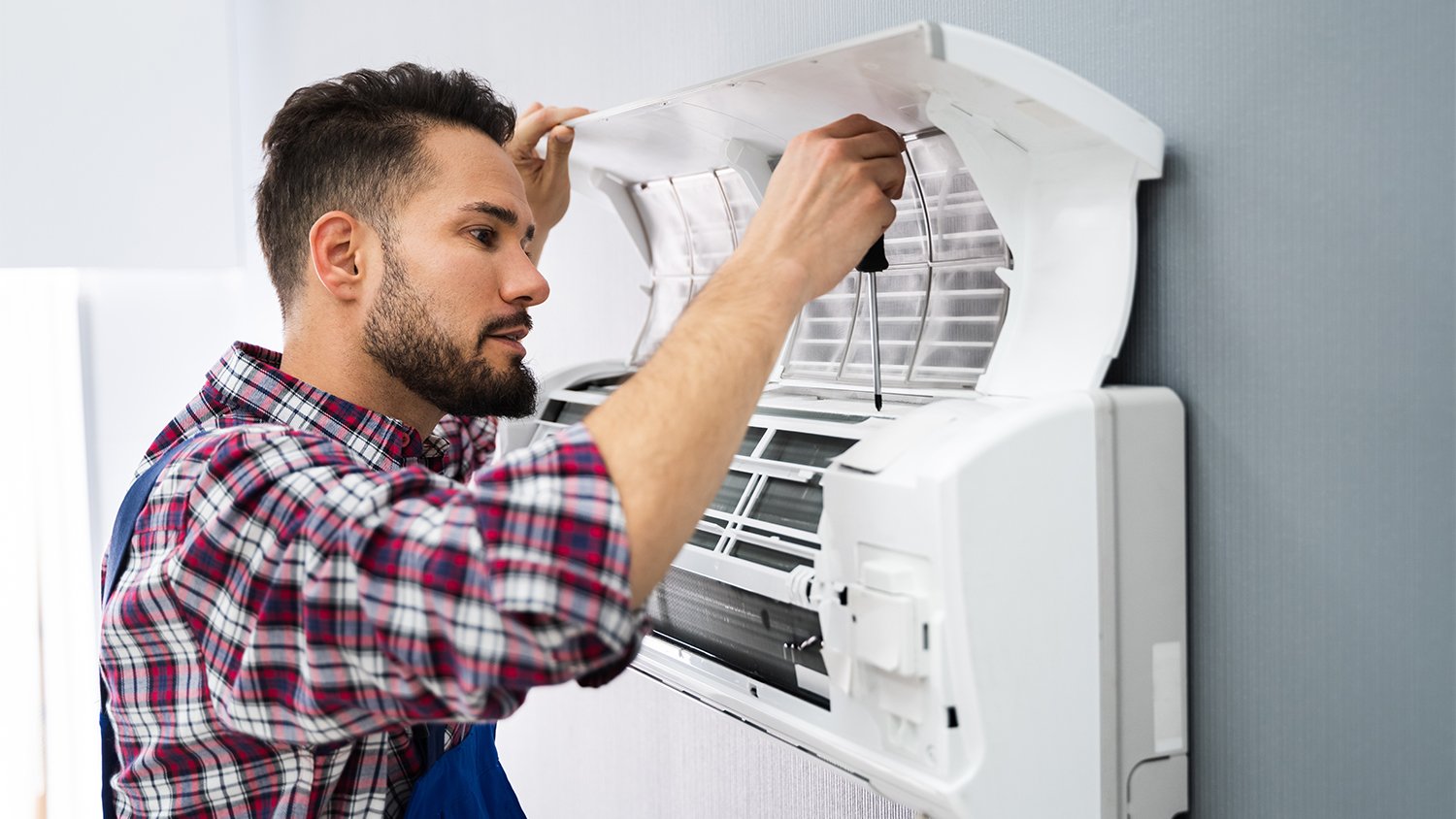7 Tips for Hiring the Right HVAC Technician
Hot or cold, selecting the right HVAC technician is key to getting it just right


When such a vital system is on the fritz, you may feel pressured into hiring the first HVAC technician with immediate availability. But HVACs are complicated systems, and servicing them incorrectly can have dire consequences. How do you find a local pro who understands the various manufacturers and products on the market? For starters, you can tell a good HVAC technician by how they quote and bid for your job. But that’s just the beginning. Here are seven tips for hiring the right HVAC pro.
1. Gather Information About Your HVAC System
To thoroughly interview potential pros, you’ll need to understand your HVAC system first. An informed technician will be able to quote for your project more accurately when they know key information upfront. Provide your HVAC pro with:
The manufacturer and model information
A short history of maintenance and repair work done on your system
A brief account of the current problems—when it began, how it developed, and what isn’t working correctly.
2. Create a Short List of Certified HVAC Companies to Research
Next, create a shortlist of three or four HVAC companies in your area for further research. Ask neighbors, friends, and families for the names of any HVAC companies that performed similar work for their home HVAC systems. Then, search online for local, certified pros (the Angi database is a good place to start).
Check out your state’s licensing board’s website for a list of certified techs. The Air Conditioning Contractors of America also provides a searchable database of contractors based on location.
3. Verify Their Credentials
As an added precaution, make sure to verify that your pros credentials are active and relevant to the job at hand. This includes state licensing, various HVAC professional certifications, and insurance. Your state’s licensing board most likely has established requirements for HVAC licensing to make sure contractors are properly trained and experienced. Use Angi’s License Check tool to find your state’s licensing requirements and website links.
Professional certifications from various organizations also provide a way for providers to prove their training, experience, and skills on the job. Look for certifications such as:
North American Technician Excellence,
Section 608 Technician Certification awarded via the EPA
HVAC Quality Installation certification awarded via Air conditioning Contractors of American (ACCA)
Any contractor who performs work inside your home should carry general liability and worker’s compensation insurance.
4. Check References
A reputable HVAC technician will have references on hand or client testimonials. Ask questions such as the following to get an idea of how the technician performed on the job:
What was the exact work the technician did for you?
Did you get a quote or proposed price ahead of time?
If so, how closely did the final price you paid match that quote?
Was the work done on time?
Did they keep the work site neat and orderly?
Would you hire them again?
5. Qualify Their Experience and Training

Most master technicians will gain experience in apprenticeships or similar programs that allow them to work alongside a seasoned technician. Make sure the tech you hire has several years of experience.
If possible, look for a technician who has the versatility to work with all major HVAC systems, and even a few obscure ones.. Ask questions about the technician’s experience and training, particularly with respect to your specific system components. Ask questions such as:
Have you ever worked with this brand and model before?
What kind of work did you do?
Did you receive specific training for this brand’s products?
6. Get Competitive Quotes
A good HVAC technician will quote you a competitive price within market range. Average HVAC costs vary depending on the type of unit and the nature of the problem. If your furnace is acting up, the cost to repair it can be as low as $130 or as high as $2,000, with an average around $300. For air conditioning units, the cost of a major repair averages between $450 and $1,000.
To ensure you get the best possible price from a qualified HVAC pro, ask for detailed quotes or cost estimates from your three top contenders. When they know other companies are competing against them, most contractors offer a competitive price for the work in question.
7. Beware of HVAC Payment Scams
Many unscrupulous and unqualified providers put on a good show at the beginning but then wind up pressuring clients for increased fees and unnecessary work.
While you’re vetting and evaluating your potential pros, keep an eye out for any provider who asks for payment up front, before the work actually begins (apart from a reasonable down payment or deposit as agreed on in the contract).
Finally, make sure you have a contract signed by the provider that covers the following terms:
The scope of work
Timelines for various phases of the work and job completion
Payment fees and their specific due dates
The provider’s obligation to provide proof of insurance and licensure before beginning work.
Asking for quotes from three or more professionals can also help you avoid being taken in by a scam. You’ll be able to spot excessive fees in comparison to lower competitive quotes.





- Furnace Repair
- Air Conditioning Repair
- HVAC Repairs
- Furnace Installation
- Wood & Pellet Stove Repair
- Dehumidifier & Humidifier Repair
- Heat Pump Companies
- Swamp Cooler Repair
- Wood Stove Services
- HVAC Companies
- Commercial A/C Repair
- Geothermal Installation
- Air Conditioning Installation
- Boiler Repair
- 24 Hour Furnace Repair
- Geothermal Repair
- Heat Pump Repair
- Humidifier Installation
- Thermostat Repair
- Thermostat Installation
- Nest Installation
- Heating & Cooling
- Heating Repair
- Furnace Cleaning
- Furnace Tune-Up
- HVAC Technicians
- Subcontractors
- Furnace Maintenance
- Plumbing & Heating Companies
- Wood Stove Inspection
- Mini Split Installation
- Wall Heater Repair
- Duct Installers














